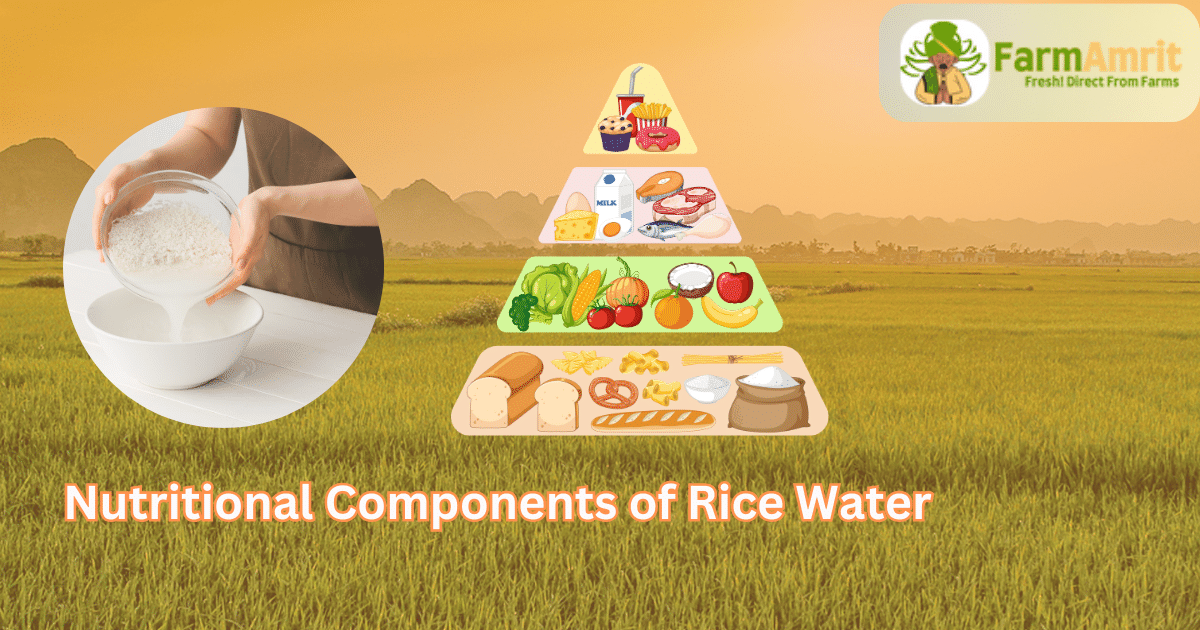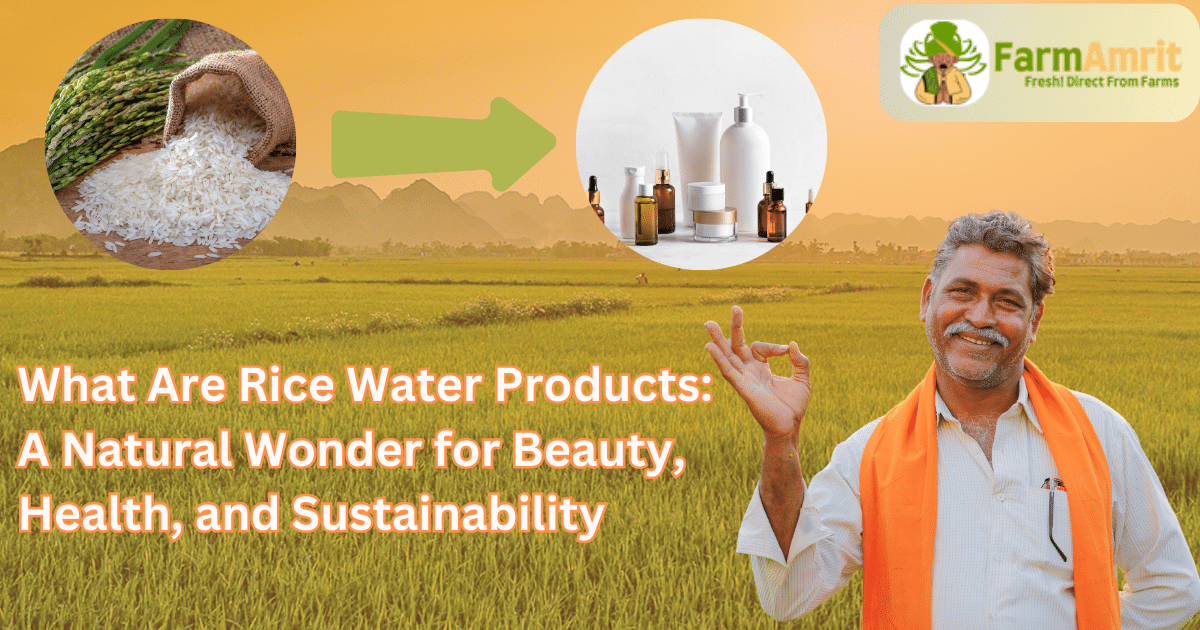What Are Rice Water Products?
One of the basic foods that is most commonly consumed worldwide, rice has a deep cultural importance and a long history. However, did you also know that rice water—the liquid that remains after cooking or soaking rice—is an important resource for sustainability, health, and beauty?
We’ll look at the many uses of rice water, its incredible health benefits, and how it can improve the lives of both consumers and farmers in this blog post.
Understanding Rice Water
Simply said, rice water is the liquid that remains after rice has been soaked, rinsed, boiled, or fermented. It has been used for centuries in Asian countries like India and China as a natural cure for a variety of ailments and as a skin and hair beauty enhancer.
Starch, vitamins, minerals, antioxidants, and other healthy substances that can nourish and guard the body can all be found in rice water.
Nutritional Components of Rice Water

Rice water is rich in carbohydrates, especially starch, which can provide energy and hydration. It also includes B vitamins, which are necessary for metabolism and nerve function, and include thiamine, riboflavin, niacin, and folate.
Additionally, rice water contains trace amounts of minerals that are essential for bone health, blood formation, muscle contraction, and immune system function, and calcium, iron, magnesium, potassium, zinc, and selenium. Antioxidants like ferulic acid and allantoin, which can combat inflammation and free radicals, are also present in rice water.
Rice Water Products in the Market
Because of its many advantages, rice water has gained popularity as an ingredient in a wide range of products. These goods include everything from supplements for health and wellness to cosmetics and personal well-being. Several popular varieties of rice water products include:
- Shampoos and conditioners: These items use rice water to make the hair more strong, shiny, and elastic while also cleansing and moisturizing it.
- Facial cleansers and toners: These products use rice water to gently remove dirt and impurities from the skin, as well as to balance its pH level and soothe irritation.
- Masks and creams: These products use rice water to brighten the skin’s complexion, hydrate and nourish it, and lessen the appearance of aging.
- Drinks and teas made of Rice Water: These products use rice water to help with digestion and metabolism, as well as to hydrate and nourish the body.
- Powders and capsules: These products provide concentrated amounts of vitamins, minerals, antioxidants, and other health-promoting substances to the body through the use of rice water.
Beauty and Personal Care

In cosmetics and personal hygiene products, rice water is one of the most widely used applications. The following benefits of rice water for skin and hair health have been shown:
- Moisturizing: By creating a barrier that stops water loss, rice water helps keep moisture in the skin and hair.
- Brightening: By preventing the synthesis of melanin, rice water can help reduce hyperpigmentation and balance out skin tone.
- Anti-aging: By increasing skin elasticity and collagen synthesis, rice water can help minimize wrinkles and fine lines.
- Anti-inflammatory: By lowering histamine release and relieving irritation, rice water can help reduce inflammation and redness.
- Anti-microbial: By preventing the growth of bacteria and fungi, rice water can help avoid infections.
Scientific research backs up these effects. For instance, a 2010 study discovered that mice’s skin damage from UV light was improved by fermented rice water extract. A study also discovered that rats’ rates of hair growth were accelerated by fermented rice water extract.
Well-being and Health
Rice water is also frequently used in health and wellness products. It has been demonstrated that rice water is beneficial for several health issues, including:
- Digestion: By hydrating and soothing the stomach lining, rice water can help relieve digestive issues such as diarrhea, constipation, nausea, vomiting, and gastritis.
- Metabolism: By promoting thermogenesis, or the production of heat, and fat oxidation, or the burning of fat, rice water can help speed up metabolism.
- Immunity: By increasing the activity of natural killer cells, a subset of white blood cells that fight infections, and modifying the production of cytokines, a type of protein that controls inflammation, rice water can help strengthen immunity.
- Detoxification: By boosting bile and urine production, rice water can aid in the body’s removal of toxins.
Scientific studies also confirm these effects. As an illustration,
In diabetic mice, fermented brown rice extract increased insulin sensitivity and glucose tolerance, according to a 2016 study. Another study discovered that fermented brown rice extract protected rats’ livers from damage caused by alcohol.
Economic Impact on Farmers
The financial impact that rice water products have on farmers is among their most significant features. Farmers who cultivate rice as their primary crop may be able to make money from rice water products. Farmers can enhance the value and profitability of their rice by incorporating rice water as an ingredient or a by-product. Additionally, rice water products may stimulate demand for uncommon rice varieties like wild rice, black rice, and red rice. Despite having better nutritional and medicinal qualities than white rice, these varieties are frequently disregarded because of their higher cost and low production. Rice water products can contribute to the preservation of rice’s heritage and biodiversity by promoting these varieties.
Sustainable Farming Practices
The sustainability of rice water products is another crucial feature. Products made from rice water can promote environmentally and socially beneficial sustainable farming methods. Among these methods are:
- Organic farming: Rice is grown organically, which means that no artificial fertilizers, pesticides, or genetically modified organisms (GMOs) are used in the process. This can enhance the quality and safety of rice water products while lessening the negative effects of rice farming on the environment.
- Water conservation: This technique involves cultivating rice with less water by using drip irrigation, alternate wetting and drying (AWD), or the system of rice intensification (SRI). In addition to conserving water, this can lower greenhouse gas emissions from rice fields.
Consumer Tips and Recommendations

By following some advice, you can contribute as a customer to maintaining the sustainability and quality of rice water products. Among them are:
- Opt for organic: To make sure rice water products are devoid of GMOs and artificial chemicals, look for labels certifying their organic status eg in India look for Jaivik Bharat (fssai.gov.in) certified products.
- Opt for fair trade: To make sure that rice water products support fair prices and wages for farmers, look for fair trade certification labels on them.
- Go local: To make sure that rice water products boost regional economies and cut down on emissions from transportation, look for labels indicating local origin.
- Opt for natural: Check the labels of rice water products for natural ingredients to make sure there aren’t any artificial additives or preservatives present.
In summary
Rice water is a natural wonder, it offers numerous advantages for sustainability, well-being, and aesthetics. It is a component of many goods that satisfy diverse consumer demands and preferences. Additionally, it improves the lives of farmers who cultivate and prepare rice. For rice water products to remain sustainable and of high quality, there are a few additional issues and concerns that must be taken into account. As a customer, you have the power to choose wisely and to back companies that provide premium rice water products and uphold moral and environmental standards. You can benefit from rice water and make a positive impact on the world by doing this.

